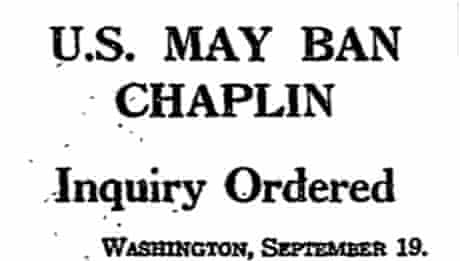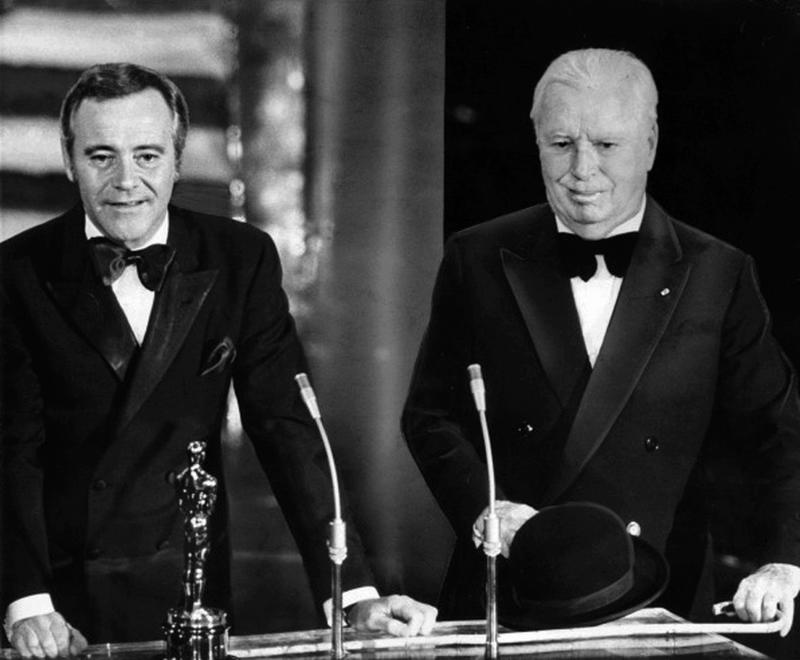When Charlie Chaplin Was Banned From America For Communist Rumors

British-born Charlie Chaplin was one of America's best-loved silent film stars and one of the few who made a smooth transition into "talkies." He enjoyed a prolific career in Hollywood well into the '50s until the Red Scare got Charlie Chaplin banned from America.

(United Artists/Wikimedia Commons)
Charlie Chaplin In Politics
The 1940s were a rocky time for Charlie Chaplin. He went through a high-profile divorce from his second wife, and the film industry was transitioning from silent movies to talkies, a move that intimidated Chaplin. He took several months off to travel the world, first to his homeland of England and then across Europe and into Japan, where he met with politicians and social leaders who stoked his interest in the plight of the working class.
Upon his return, he wrote, filmed, and starred in Modern Times, which had a clear anti-capitalist message that made a splash with the public, particularly those in the U.S. government. In Chaplin's next film, The Dictator, the actor portrayed a Hitler-like character. The film was highly regarded, and its anti-war and anti-fascist themes made it a favorite of President Franklin Roosevelt, but not everybody was on board. The film drew the attention of J. Edgar Hoover, the director of the F.B.I., who was concerned that Chaplin's political views were drifting too far into the red.

(Library of Congress/Wikimedia Commons)
Joseph McCarthy And The Red Scare
In the late 1940s and '50s, the American public feared an invasion of communist ideas. Leading the movement was Joseph McCarthy, a senator from Wisconsin who was convinced that communists had infiltrated the top ranks of the U.S. government, Hollywood, and the world of professional sports and feared that these powerful figures would use their influences to turn America red. In what can best be described as a witch hunt, McCarthy and his House Committee on Un-American Activities worked to identify people who were "loyalty risks" to the United States. Those who were targeted and accused by the committee were put on trial, and even if the accusations proved unfounded, it was enough to ruin a person's career.

(The Guardian)
Charlie Chaplin In The '50s
World War II brought out Chaplin's political side. Although he claimed that he wasn't a communist, he did voice his opinion that the U.S. should launch a second front to help the Soviet Union during the war, pushed for improved U.S.–Soviet relations, and attended some Los Angeles social gatherings hosted by Soviet diplomats. The F.B.I. had its eye on the actor and his political activities as early as 1947, but it took five more years for them to achieve their goal of getting Charlie Chaplin banned from America.
On September 18, 1952, Chaplin left the United States for a trip to Europe to promote his newest film, Limelight. He intended to be back in the U.S. within six months, but the next day, the Attorney General of the United States announced that Chaplin would be denied reentry if he returned. Chaplin's ship had yet to even reach Europe when he got the news. Back on dry land in England, he insisted to reporters that he was simply a "peacemonger" who wanted "a roof over every man's head."

(Associated Press/Wikimedia Commons)
Exile In Switzerland
Chaplin was outraged by his exile. Even if his passport was British, he had lived in the United States for more than four decades, far longer than he'd lived in his supposed homeland. Having found a home in Switzerland, he vowed never to return to the United States again, but he couldn't stay mad forever. In 1972, after 20 years of exile, he appeared at the Oscars to accept an honorary award. Still, he didn't stay for long. He quickly returned to Switzerland, where he stayed until 1977, when he died in his sleep at the age of 88.

Chaplin did not travel the world in the 1940s (WW2 was a teeny obstacle) but in the 1930s. The Great Dictator was released in 1940.
ReplyDelete